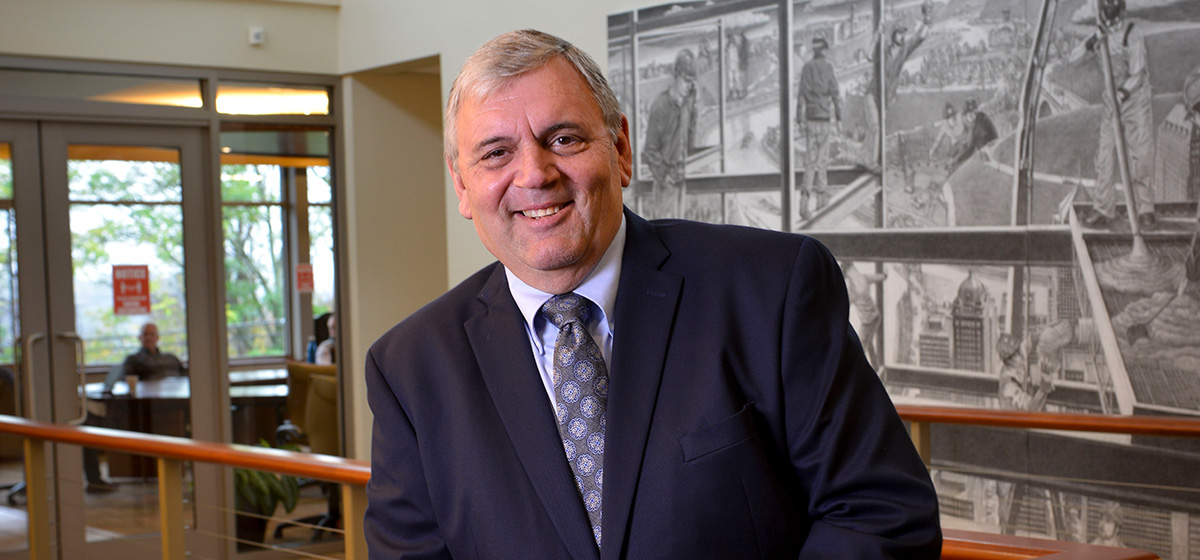Seeking a Broad-Based Pittsburgh Economy

Q. What is Pittsburgh Works? How and why did it come about?
A. Pittsburgh Works is a coalition that believes in the importance of having a strong and balanced local economy that includes and appreciates all of the important industrial sectors, including energy and manufacturing. We need jobs of all kinds for all kinds of our workers if we’re going to continue to rebuild our regional economy and have a strong and diversified future.
It really started as casual conversations between a few members of the Builders Guild, construction trade union leaders and contractor associations as well as a few energy companies, Peoples and U.S. Steel. Initially we focused on rebutting some of the misperceptions about our industries, a lot of which were on the environmental side. We felt that we needed to counter some of these things.
We’re not environmental deniers. We want things to be done right. We want good air and water quality. Often when you have proponents of renewable energy, they want nothing but solar and wind power, and they want it done now. But let’s be realistic. You don’t just flip a switch and go to that. At least with current technologies, there are limitations to solar and wind. So you still have to rely on the grid, whether that’s being generated by coal or natural gas. There are also technologies like carbon capture that would not necessitate the end of using fossil fuels for power generation. There’s a place for all technologies. We’re trying to balance that discussion. We don’t want to be adversarial—or controversial—but too often that full story does not get told.
We decided to move forward in November of last year and did some quantitative research and focus groups to sanity-check ourselves and see what people really believed. Even in January of this year, the number one issue on people’s minds was the economy. This is when unemployment was 3.5–4 percent. The second was crime. The environment was third. I was surprised it wasn’t close to the top or the top, based on everything you see read and hear in our region.
We asked: Are you willing to sacrifice jobs for the sake of continuing improvement in the environment? The answer was no, but no one wanted to see us backslide environmentally and it was clear we should continue to improve the environment. They were saying what we believe—that you can have both. You’re never going to live in a world without emissions or impacts. The fact that human beings exist is going to affect the environment.
We want the tech and health care and academic industries to grow. Pittsburgh is not going to grow and survive just on technology companies. If any city should know the folly of depending on any one industry, it should be us. What we really want to do is balance the conversation and provide accurate information, whether it’s to the general public, or elected officials or the foundation officials. What they do with it we can’t control.
Q. The Pittsburgh metro area and the counties surrounding it have the unusual problem of continuing population decline. Can Pittsburgh Works be part of the solution to stabilize our regional population by bringing jobs and people?
A. We’re also focused on re-shoring manufacturing. This is an area we are well suited for—bringing things back from countries that aren’t our friends. We want to bring together political leaders, civic leaders and other organizations to ensure that a large volume of this re-shoring comes to our region. It’s not going to happen if we just sit here and want it. We want to create an atmosphere that’s favorable for growth in terms of corporate income tax, permitting and worker training.
We’re not saying cut corners and make it the wild west—we believe in regulations and monitoring—but we want to create a friendlier business climate and opportunities for younger people to stay, and not just those with four-year degrees. If you’re creating those opportunities where people can earn a very solid middle-class income—$80,000–$100,000 a year with benefits—more people will stay. Some are going to leave, but you have a greater chance of attracting people from other areas.
We have a very attractive cost of living, and it’s a family friendly place, with all the amenities of a big city. We believe we can grow that population base and get more young people into the mix, but if you don’t have the opportunities, why would anyone stay?
Q. How has COVID affected your plans, and how have you adapted?
A. Pre-pandemic, our focus was on protecting our industries and showing their benefits. Clearly, the pandemic was devastating, but it’s also opened up some doorways here that could be very beneficial in the long term not just for the region, but for the country, too.
When you look at our region, the tech companies want to be in the Strip District and Oakland, and that makes sense. But when you look at the old Mon Valley mill towns, they’re not going to turn around because tech companies go there. It’s going to be manufacturing. We have a wealth of open, available land. We have the energy. We have the workforce and the training programs. It’s a very natural fit. The hope for those communities is going to be largely on manufacturing and complementary industries. People have to accept that fact and embrace those opportunities. We all talk a lot about what we should do for these communities to help them get back on even footing. Well, that’s how we do it.
Q. What are the obstacles to reaching these goals, and how can we collectively overcome them?
A. Obstacles are trying to continue to do things the way we’ve done them. Doing what we’re talking about isn’t going to be easy. It’s going to take cooperation between groups that aren’t used to cooperating. It’s going to take political will on the parts of some politicians to step out of a comfort zone. That’s where we’re trying to play that role of getting some of these diverse groups to at least have a conversation.
Q. Is the region’s leadership dynamic and far-sighted enough to accomplish what you would like to see?
A. I think it is. It’s like anything. When we get so caught up in our own philosophies, we lose sight of our common goals and interests. Where can we do things that will be beneficial to everyone? We need to get out of the mindset that there’s only one way to do things—or being concerned over who’s getting credit. Let’s sit down and figure out what it is that’s going to best serve our region, and not just Pittsburgh or Allegheny County, but the 10–12-county region. That’s a disconnect that needs to be addressed.
It’s better to try and fail than not try. And right now, I don’t know that we’re all trying that hard. We sit here and talk about the pandemic and the negative things, but at some point, you have to realize that, in time, this will pass. We can’t allow ourselves to sit here paralyzed for the next year or more. We have to start moving forward.
More information about Pittsburgh Works can be found at pghworks.com.





